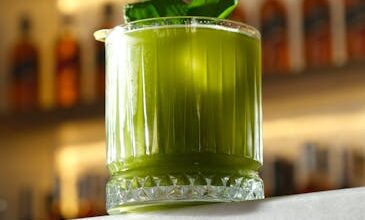The Age-Old Dance of Fire and Flavor

Ah, the ritual of the spirit. Whether it’s the rich complexity of an aged Scotch, the vibrant zest of a gin, or the smooth warmth of a fine tequila, there’s an artistry to crafting and enjoying distilled beverages. But let’s be honest: for many, myself included, that initial fiery embrace on the palate can be a bit… much. That distinct “burn” is often part of the experience, a badge of honor for seasoned drinkers. Yet, what if you could have all the nuanced flavors, the aromatic depth, the satisfying mouthfeel, without the aggressive heat?
It sounds like something out of a futuristic bar, doesn’t it? But a startup called Voodoo Scientific is turning this dream into a tangible reality, using a rather ingenious method: enzyme-tinkering. They’re on a mission to re-engineer the very sensation of spirits, promising a more sippable tipple without compromising the essence of what we love. This isn’t about diluting a good drink or masking its character with mixers; it’s about a fundamental transformation that could change how we perceive — and consume — spirits.
The Age-Old Dance of Fire and Flavor
For centuries, the burn has been an inherent characteristic of distilled alcohol. It’s primarily caused by ethanol, the alcohol itself, which activates specific receptors in our mouths and throats, triggering a sensation often perceived as heat or irritation. Think of capsaicin in chili peppers; it’s a similar sensory trick, just with a different chemical culprit. Distillers have long employed various techniques to mitigate this harshness: extended aging in barrels to mellow the spirit, careful blending, precise cuts during distillation, and even charcoal filtration.
These methods are cornerstones of the industry, deeply ingrained in tradition and craftsmanship. An aged whiskey, for example, develops its profound character and smoothness over years, as it interacts with oak, breathes, and slowly transforms. It’s a beautiful, time-intensive process. But what if there was a way to achieve a similar level of perceived smoothness and drinkability, not by waiting decades, but by subtly altering the spirit at a molecular level?
This is where Voodoo Scientific steps onto the stage, not to replace the old ways, but to offer a revolutionary complement. They’re not looking to strip spirits of their character, but rather to refine the delivery, making the entire tasting experience more approachable and enjoyable for a broader audience, without losing what makes each spirit unique.
Voodoo Scientific’s Alchemical Twist: Enzymes to the Rescue
The secret sauce, as it were, behind Voodoo Scientific’s innovation lies in its application of enzyme technology. Now, “enzyme-tinkering” might sound like mad science, but in reality, enzymes are the unsung heroes of countless natural processes, from baking bread to brewing beer, and even within our own bodies. They are biological catalysts, designed to accelerate specific chemical reactions without being consumed in the process. Think of them as tiny, highly specialized molecular tools.
While the exact proprietary process remains, well, proprietary (and rightly so!), the core concept is fascinating. Imagine an enzyme designed to subtly interact with the components in fiery hooch that contribute most to the burning sensation. It’s not about removing the alcohol – that would defeat the purpose – but rather about modifying the way those specific compounds interact with our sensory receptors. This isn’t a mask or an additive; it’s a structural adjustment, a kind of internal polishing, that allows the spirit’s true flavors to shine through more clearly.
Unlocking the Palate: Beyond Just Smoothness
The implications of this approach extend far beyond simply making spirits “less harsh.” When the dominant sensation of burn is reduced, our palates are freed to detect a far wider spectrum of flavors and aromas. That subtle note of vanilla, the whisper of peat, the bright citrus zest – all can become more pronounced, more discernible, and ultimately, more enjoyable. It’s akin to clearing away static on a radio channel; suddenly, the music comes through with pristine clarity.
This could revolutionize how we taste spirits, opening up new dimensions for both connoisseurs and novices. Imagine a new generation of craft spirits designed from the ground up to leverage this technology, offering unprecedented flavor complexity without the accompanying heat. Or perhaps classic spirits made more approachable, inviting more people to explore categories they might previously have found too intimidating.
For mixologists, this could be a game-changer. Smoother spirits mean less need to “tame” them with sugars or other strong flavors in cocktails, allowing for more delicate and intricate drink creations where the spirit’s character remains the star. It’s an exciting frontier for innovation, pushing the boundaries of what’s possible in the world of beverages.
The Road Ahead: Challenges and Opportunities for Spirit Innovation
Of course, pioneering such a disruptive technology comes with its own set of hurdles. Consumer perception will be key. In an industry steeped in tradition, any perceived alteration to the “natural” process can be met with skepticism. Voodoo Scientific will need to clearly communicate the science, the safety, and the benefits, reassuring consumers that this is an enhancement, not a compromise.
Regulatory bodies will also play a crucial role. Ensuring that these enzyme processes meet health and safety standards for food and beverage production will be paramount. Scaling the technology from laboratory to industrial application will also present its own engineering and logistical challenges. How do you integrate this into existing distilleries without requiring massive overhauls?
However, the opportunities far outweigh these challenges. Beyond enhanced flavor and drinkability, this technology could contribute to sustainability efforts. If certain aspects of smoothness can be achieved through enzyme processes, could it reduce the need for incredibly long aging periods for some spirits, thereby lowering energy consumption and environmental impact? It’s a compelling thought for a forward-thinking industry.
Moreover, Voodoo Scientific isn’t just selling a process; they’re selling an experience. They’re tapping into a universal desire for enjoyment without discomfort. From casual drinkers seeking an easier entry into spirits to seasoned aficionados looking for new dimensions of flavor, the potential market is vast. This kind of scientific advancement signals a fascinating future for the spirits world, one where tradition meets cutting-edge innovation.
The Future is Smooth, and Full of Flavor
The journey of a spirit, from grain to glass, has always been a blend of art and science. What Voodoo Scientific is introducing with its enzyme-tinkering process isn’t a replacement for the master distiller’s craft, but rather a powerful new tool in their arsenal. It’s an invitation to explore spirits with fewer inhibitions, to discover notes and nuances previously masked by a fiery façade.
As consumers, we stand at the precipice of a potentially revolutionary shift. Imagine your favorite spirits, elevated to a new level of approachable perfection, where every sip is a discovery, not a challenge. This isn’t just about making “fiery hooch” more sippable; it’s about refining the very essence of the drinking experience, making it richer, more nuanced, and ultimately, more enjoyable for everyone. The future of spirits looks remarkably smooth, and delightfully flavorful.





